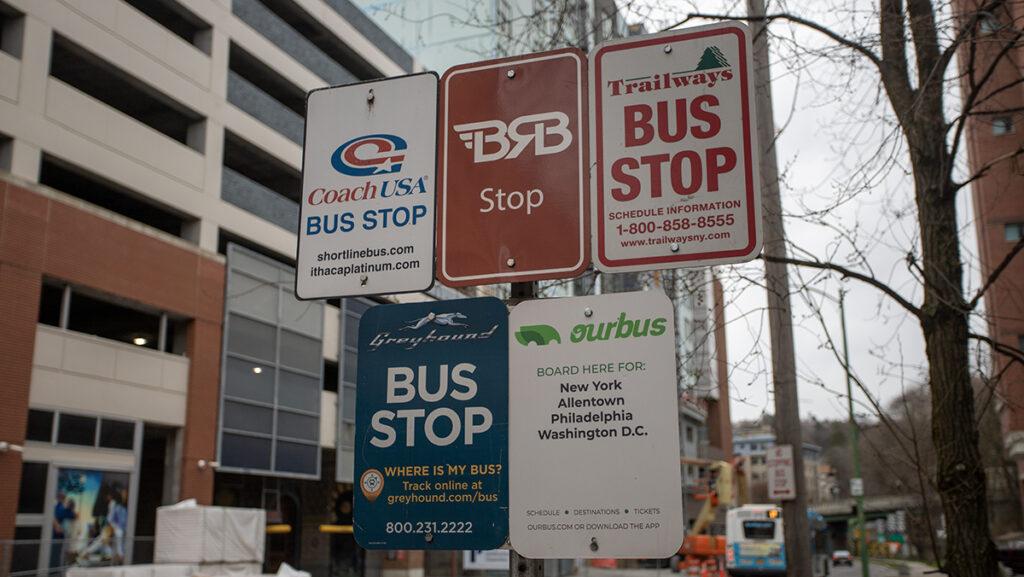The Downtown Ithaca Alliance is currently looking into the feasibility of creating an intercity bus hub, a physical space for people to wait for buses that travel between cities, in the City of Ithaca.
On March 18, a survey was sent to the campus community through an Intercom message, asking for input from students, faculty and staff about their use of intercity bus travel. Intercity buses, like Flix and Ourbus, have routes that travel from the City of Ithaca to different cities across the country. According to the Intercom message, the survey was open until March 30 and the DIA hoped to gather information and understand the needs of people in the City of Ithaca and to eventually create an intercity bus hub.
Gary Ferguson, executive director of the DIA, said he noticed patterns in the answers from the survey about what the future bus hub should include. Ferguson said 602 people have answered the survey.
“Certainly, people want to see an intercity bus hub project that was designed with safety and security in mind,” Ferguson said. “They’re interested in restaurants, they’re interested in some sort of covered or indoor waiting area. They’re less interested in customer service. … Access to public pickup and drop off is important. Actually almost twice as important as access to public parking.”
Ferguson said there is a working group that is meeting to create the plans and ideas for the bus hub. Eric Hathaway, director of Parking and Transportation at the Department of Public Works in the City of Ithaca, said the working group is made up of representatives from the Ithaca-Tompkins County Transportation Council, TCAT, City of Ithaca, DIA, Tompkins County and a representative from Williams Design Group, a local design and planning firm.
“It’s primarily been these two meetings that we’ve been able to discuss what we think are the major priorities for this facility, what characteristics does it need to have and what are some potential ideas for where it could go to be held,” Hathaway said.
Ferguson said the working group has met twice to discuss the key points of the survey. These points include cost efficiency, operation, location and determining what a bus hub can be for the City of Ithaca. Ferguson said there is a wide range of infrastructure types the working group has discussed.
“We want a scope of work, what’s a bus hub,” Ferguson said. “Is it a port authority? Or is it a covered picnic table or something in between? So that’s what we’re trying to answer right now.”
Although no physical bus hub has been built yet, Ferguson said the DIA will consult the survey along with other bus hubs surrounding Ithaca, like Burlington, Vermont, Binghamton and Corning, New York, for ideas. Hathaway said this will help the DIA determine what type of infrastructure, seating and amenities will be included in the plans for the hub.
Hathaway said the specific patterns in the survey included Americans with Disabilities Act accessibility, for the bus hub to be safe, clean, to have sufficient lighting, bathrooms, ticketing services, adequate parking and space for drop off.
“I think that the primary thing is that it [the bus hub] would be an inviting and safe space,” Hathaway said, “A space that people want to use.”
According to the survey, 3% of participants use intercity buses weekly, 16% take an intercity bus monthly, 37% quarterly and 34% at least once a year. Ferguson said the rest of participants took the survey because they were interested in the creation of a bus hub.
“We got people answering this, obviously from a lot of local people, a lot of students answer[ed the survey], including a lot of IC students,” Ferguson said.
Although the survey did not take into note the demographics of the participants, Ferguson said at least 50% of the participants were college students because the email participants gave were connected to a collegiate institution. He said students who took the survey wrote that they would prefer intercity buses to sync with routes of the TCAT and other transportation services.
“That kind of linkage, especially for students, if you don’t have a car, or you don’t want to leave your car, you can leave your car on campus and take a bus or take a cab here and and then go [to the intercity bus stop] and make those connections very easily,” Ferguson said. “From here, you know, we want it to be easy and convenient.”
First-year Ithaca College student Annabella Marz is from Washington D.C. and said her experience at the sidewalk waiting area on East Green Street has been more of a negative experience than the bus hubs in D.C.
“It [a local bus hub in D.C.] was just a lot more organized than being dropped off at a random spot, standing outside of Starbucks or something in Ithaca,” Marz said.
Judy Qian, a senior at Cornell University, said she took an intercity bus to New York City from Ithaca during winter break. The bus stop is located on Seneca Street in front of a Starbucks.
“There is no overhang at the stop and the Starbucks was closed, so everyone was freezing,” Qian said. “The new stop [at the Seneca Street Garage] would be cool.”
Ferguson said the necessity of an intercity bus hub would be able to provide travelers to and from Ithaca with a safe resting spot to wait for the bus, yet a location has not yet been selected for the project. One site that is being researched by Ferguson and his team is the Seneca Street Garage.
“If the garage needs to be redone, there’s an opportunity perhaps to do something there, if it makes sense,” Ferguson said. “[Another factor is] if it fits, and if it’s not too cost prohibitive. All the factors have to come into play.”
Ferguson said additional factors that play into whether a site is a good fit for a bus hub is whether the site is in public domain and has easy access and if costs are reasonable for the city.
“For example, we won’t be building a port authority,” Ferguson said. “That kind of demand is not here … that’s very, very expensive to build and very, very expensive to operate. And nobody in this community is up for that.”
Marz said that while plans to redesign the Seneca Street Garage into a bus hub may allow for more space for intercity buses in the downtown area, it would also get rid of some available parking around The Commons.
“I understand where they’re coming from but I think if they [City of Ithaca] could get organized and manage that, I think it could be done, but it’d be a bit of a hassle,” Marz said. “That’s one less layer of parking. But I’m sure it’ll be alright. Because one thing is, this is a college town. So a lot of the students don’t have cars.”
Marz said The Commons already feels cramped and trying to add a bus hub or terminal would be a risky endeavor for the city.
“It just feels really cramped,” Marz said. “It feels like they’re trying to shove it in there. I think a bus terminal would be convenient if they can figure it out.”
Mickey Cochran, a senior citizen of Ithaca who takes an intercity bus to Chicago, said having a bus hub with amenities would be great for travelers to have.
“It would be cool to have a place for people to keep warm, use the bathroom and get a cup of coffee,” Cochran said.
Hathaway said intercity busing is an important piece of transportation for the city because it is widely used by students and is a less expensive way to travel between cities throughout the country.
“It’s obviously something that’s popular and it moves quite a lot of people, but I heard someone quote that intercity buses actually move more people than [Ithaca’s] airport does annually,” Hathaway said. “It’s a pretty important way of moving people around to specific destinations in and out of the city. And there’s certainly been expansion over the last few years, more bus providers, providing more service. So I would imagine that trend is likely to continue into the future.”










